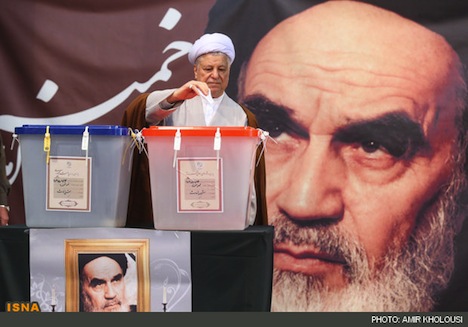Mark Dubowitz, the executive director of the Foundation for Defense of Democracies, writes in The Atlantic this morning that Iran has a ‘presidential selection,’ not a presidential election.![]()
That will come as some surprise to Iran’s 75 million citizens, many of whom have turned out today to participate in the first of what is likely to be two votes to determine who will succeed outgoing Iranian president Mahmoud Ahmadinejad. Moreover, the ultimate winner of the election will pay a vital role in shaping policy for the struggling Iranian economy over the next four years and, more crucially for the United States, help determine the tone that Iran will take with respect to ongoing P5+1 negotiations over the future of Iran’s nuclear energy program.
Iran’s democracy is, shall we say, less than perfect from any objective standards of democracy — Western, Islamic or otherwise.
But Dubowitz is essentially arguing that the election has no consequences:
But Iranian voters know better. The election may indicate changes in the interfactional balance of power within the regime, and a victory by [Hassan] Rouhani or [Mohammad Baqer] Qalibaf may temper the tone of the regime’s nuclear intransigence, but there will be no change in substance. In the Islamic Republic of Iran, election in reality means selection. [Supreme Leader Ali] Khamenei will remain in charge.
But that Khamenei will remain in charge is a coals-to-Newcastle argument. Today’s election is for president, not for Supreme Leader.
We may not like it, but the dual roles of the Supreme Leader and the Iranian president are part of the system of Iran’s government for over three decades. You can, perhaps, think of the Supreme Leader as a strong head of state and the president as the head of government. It’s perhaps easier to think of Iran’s president as akin to a prime minister — Iran had a prime minister in the 1980s, but the office ended in 1989, largely because of the overlap between the president and the prime minister. It’s arguable that Iran’s president has more independence from the Supreme Leader than, in effect, French prime minister Jean-Marc Ayrault has from French president François Hollande.
Perhaps Iran’s is not the most representative system, but it’s more representative than the dictator-for-life model that Hosni Mubarak effected in Egypt for three decades with the full bipartisan support of U.S. policymakers. It’s also more representative than the current system of selecting the leadership of the People’s Republic of China as well.
Dubowitz is right that there are many reasons to cast doubt on the role of the Guardian Council, a gatekeeper body comprised of 12 members, six appointed by the Supreme Leader and six by Iran’s conservative-dominated parliament. Despite hundreds of hopeful presidential candidates, the Guardian Council approved just eight candidates to run in today’s election, though two have already dropped out. The Guardian Council has never approved a woman to run for the presidency, and its dubious refusal to approve former president Hashemi Rafsanjani, a moderate seen as the best shot in 2013 for reformist-minded voters, calls into question the even-handedness of the Guardian Council.
It also refused to allow Ahmadinejad’s chief of staff Esfandiar Rahim Mashaei to run, though many believe Mashaei’s campaign was a stalking-horse candidacy designed to provide Ahmadinejad a way to continue to influence policy despite a limit of two consecutive presidential terms.
Without doubt, these disqualifications (and Guardian Council interference in other minor elections, such as for Tehran’s city council, and in Iran’s parliamentary elections last year) call into question whether Iran’s odd style of democracy is as robust as it once was. Remember that eight years ago, the relatively unknown Ahmadinejad leapt over many more experienced rivals into the presidency on a conservative and populist agenda, and 16 years ago, reformist dark-horse candidate Mohammed Khatami won the presidency in a landslide as well. Continue reading What U.S. commentators get wrong about Iran — and why Iran’s election matters
